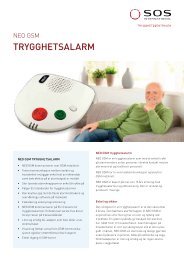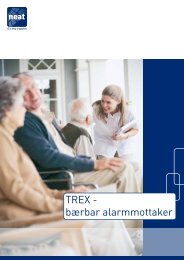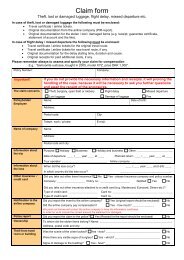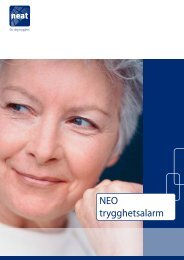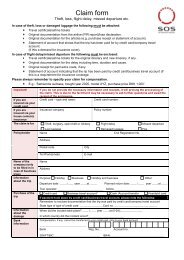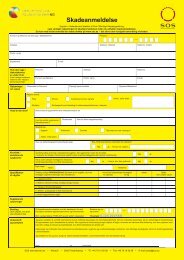Euro 2012 safety and security report - SOS International
Euro 2012 safety and security report - SOS International
Euro 2012 safety and security report - SOS International
Create successful ePaper yourself
Turn your PDF publications into a flip-book with our unique Google optimized e-Paper software.
16 <strong>Euro</strong> <strong>2012</strong> <strong>safety</strong> <strong>and</strong> <strong>security</strong> <strong>report</strong><br />
Donetsk<br />
Donetsk Regional Trauma Hospital<br />
106 Artyom Street<br />
Donetsk 340048<br />
Tel: +380 (0) 62 2551 141<br />
Lviv<br />
Sheptytsky Hospital<br />
4 Ozarkevycha Street<br />
Lviv<br />
Tel: +380 (0) 32 2726 869<br />
Kharkiv<br />
Oblast Clinic Hospital<br />
Prospect Pravdy 13<br />
Kharkiv 61022<br />
Tel: +380 (0) 57 7050 187<br />
Influenza A (H1N1)/swine flu was <strong>report</strong>ed in the<br />
Ukraine in June 2009, <strong>and</strong> has since left scores of<br />
people dead <strong>and</strong> thous<strong>and</strong>s more infected across the<br />
country. Authorities responded to the rapid spread of<br />
the disease by placing partial restrictions on domestic<br />
travel <strong>and</strong> introducing quarantine measures in<br />
Ukraine’s nine western oblasts.<br />
In December 2005, the H5N1 strain of bird flu was<br />
<strong>report</strong>ed in Crimea. Further outbreaks followed in 2006<br />
in marshl<strong>and</strong>s near the Sea of Azov. In January 2008,<br />
another outbreak of the virus was detected at a poultry<br />
farm in the Krasnogvardiyskyi Rayon in Crimea. Travellers<br />
are advised to check with health officials prior to<br />
travel to the affected areas. It is advisable to avoid<br />
contact with all forms of poultry, including wild birds,<br />
while in Ukraine.<br />
There is a risk of tick-borne encephalitis in some areas<br />
of the country below 1,400 metres, particularly the<br />
mountain forest zone of Crimea. Crimean haemorrhagic<br />
fever has also been <strong>report</strong>ed in the country in<br />
the past. Diphtheria is endemic to Ukraine, except the<br />
Poltava region, while rabies, hepatitis A, hepatitis B,<br />
tetanus, tuberculosis <strong>and</strong> typhoid may also be a risk.<br />
In addition, the country has one of the highest rates of<br />
HIV/AIDS infection in <strong>Euro</strong>pe.<br />
The risk of radioactive contamination from the 1986<br />
accident at Chernobyl is low outside the exclusion<br />
zone immediately around the Chernobyl facility. Milk,<br />
wild berries, mushrooms, <strong>and</strong> wild fowl <strong>and</strong> game from<br />
the Chernobyl region should be avoided, as these<br />
have been found to retain higher than average levels<br />
of radiation. Do not drink tap water; only bottled water<br />
or boiled water should be drunk, <strong>and</strong> ice should be<br />
avoided. Visitors are also advised against consuming<br />
food or beverages obtained from street vendors.<br />
Money<br />
In Pol<strong>and</strong>, the official currency is the zloty. Foreign<br />
currency can be exchanged easily at banks, bureaux<br />
de change (locally called Kantor) <strong>and</strong> hotel reception<br />
desks in towns <strong>and</strong> cities countrywide. Traveller’s<br />
cheques are accepted at most Polish banks <strong>and</strong> larger<br />
shops. Credit cards are widely accepted <strong>and</strong> ATMs<br />
(bankomats) are plentiful. There have been some <strong>report</strong>s<br />
of ATMs not accepting Maestro <strong>and</strong> VisaElectron<br />
cards issued by foreign banks; however, Polish banks<br />
are <strong>report</strong>edly working to remedy this problem.<br />
In Ukraine, the official currency is the hryvnia (UAH).<br />
US dollars <strong>and</strong> euros are readily exchangeable in<br />
major cities, <strong>and</strong> Britsh pounds to a lesser extent.<br />
Travellers should only use official bureaux de change.<br />
ATMs are available <strong>and</strong> credit cards are widely used,<br />
but not universally accepted, in major cities. Outside<br />
cities, travellers should carry sufficient funds in local<br />
currency. Credit card <strong>and</strong> ATM fraud, as well as money<br />
scams, are widespread. Hence, although credit card<br />
<strong>and</strong> ATM use is increasingly common, it is strongly<br />
recommended that visitors to Ukraine refrain from<br />
using credit or debit cards except at major, reputable<br />
establishments.



